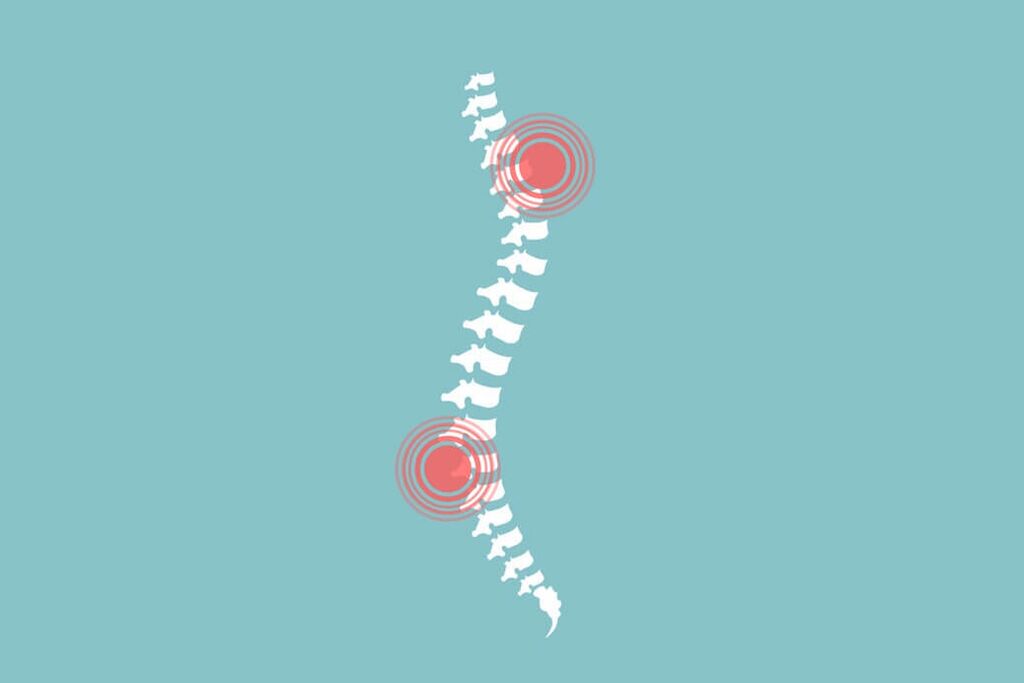Back pain, back pain is the misfortune of our time. A sedentary lifestyle, sedentary work, high-calorie diet and, as a result, excess weight contribute to the development of spinal diseases. What are we fighting for the most? And where to turn for help when our back hurts?

Why does your back hurt?
Back pain is spoken of when one feels it along the vertical axis of the body, on the side of the spine. It is estimated that up to 80% of people worldwide experience back pain. It appears in different parts of the spine: from the cervix, chest and lumbar to the sacrum. However, patients most often complain of pain in the cervical and lumbar areas.
The back makes itself felt as a result of mechanical injuries. But often the cause can be degenerative changes, inflammation or diseases that affect the mobility and condition of the joints.
Other factors that indirectly affect spinal health are also important. As we age, the spine becomes more vulnerable to injury. It is also affected by poor physical condition and lack of exercise.
This is especially true for those people who lead a sedentary lifestyle and work hard on the computer.
Workers who do heavy physical work are more susceptible to back injuries and pain from excessive exercise.
Obesity can also cause back pain as well as chronic stress and depression.
Back pain: the most common causes
- Discopati- we talk about this when we are dealing with the so-called disc herniation. It is accompanied by irritation or even damage to the nerve root. Most often it occurs in the lumbar spine. This is manifested by back pain that goes to the legs, which causes you to bend forward and arch your back. It most often affects young people between the ages of 25 and 40.
- Lumbago- also known as lumbago. Sharp, shooting pains affecting the lumbosacral region (lower back). This is one of the main reasons to visit the doctor's office. The cause is almost always mechanical damage as a result of spinal overload. The pain increases with bending and lifting objects. Sometimes it passes after a few days, but can last for several weeks.
- Sciatica- in this case, the pain is caused by squeezing a fragment of the intervertebral disc over the nerve roots. Pressure on the sciatic nerve or its roots causes severe pain that spreads to the buttocks and legs. Sciatica is an inflammation of the sciatic nerve as a result of a developing degenerative disease of the spine.
- Osteoporosis- a disease that affects the elderly, especially menopausal women. This manifests itself in a progressive loss of bone density and a weakening of bone structure, which makes them more prone to fracture. It is a condition that results in decreased bone growth, thoracic kyphosis and severe back pain. This disease can also lead to so-called vertebral compression fractures, even with minimal impact.
Who should you contact for help?
If we feel back pain, we should see a therapist immediately. The doctor will be able to perform preliminary examinations and prescribe an x-ray, CT or MRI at his discretion. If he deems it necessary, then we will get a referral to an orthopedist - a specialist in diagnosing and treating the skeletal system.
In case of problems with the spine and the entire skeletal system, it is also worth consulting a physiotherapist. He will take care of our correct posture and present a series of exercises that will strengthen the spine.
How to monitor the spine?
In the case of spinal condition, there is an old and simple rule: prevention is better than cure. Just follow a few simple rules during the day to enjoy life without back pain:
- Regular exercise.On the one hand, let’s do exercises that will allow you to maintain a proper body weight and keep fit. On the other hand, let’s do exercises that will strengthen the paraspinal muscles. We also need to remember about alignment. It will improve muscle flexibility and prevent cramps and stiffness. It will also improve the blood supply to muscles and tissues.
- Correct posture.It is necessary to monitor your posture both while walking and in a sitting and lying position. Try not to squeeze or bend your back unnaturally, such as while sitting.
- The right mattress.The way we sleep has a significant impact on spinal health. The mattress should not be too soft or too firm. It is best to consult a qualified dealer when choosing a mattress. He will choose it according to your needs.
- A balanced and healthy diet.It should be rich in essential vitamins and minerals. Also, include protein, fats and carbohydrates in the right proportions.





































